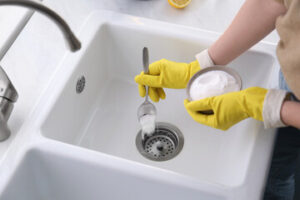Drain Cleaning: How to Get Rid of Clogged Drains Without Calling a Plumber
Drain Cleaning Tampa is important to prevent clogs, blockages, and leaks. Regularly cleaning your drain pipes can also extend the life of your existing pipes.
Eco-friendly drain cleaners are made with natural or green ingredients and are available in gel form. They are a little slower to work than caustic chemical drain cleaners.
Clogged drains are not just messy, but they can also be dangerous. They can create an ideal breeding ground for bacteria and other harmful microorganisms and can result in sewage back up and flooding your home. However, with a little knowledge of what causes clogged drains and some simple preventive measures, you can keep your home’s drains clear and running smoothly.
Hair, soap scum, mineral deposits, and other debris can clog sinks, showers, and tubs. Using a plunger or commercial drain cleaner often works to remove these items, but if the clog is caused by an object that is too large to be removed with a plunger, you may need to disassemble the drain trap or use a sewer snake.
Most drain clogs form over time as grease, hair, and other waste stick to pipe walls. The best way to prevent these clogs from occurring is to be vigilant about what goes down the drain and to dispose of waste properly. If you notice that a drain is slowing down or not functioning at all, it’s important to address the issue immediately, as it will only get worse.
Kitchen drains often clog due to food scraps, cooking oil, and other fatty substances that are rinsed down the drain. If these materials solidify, they can clog the entire pipe. You can prevent these clogs by not rinsing fats down the drain and by disposing of fatty foods in the garbage.
Bathtub, sink, and toilet drains can also become clogged due to the buildup of soap scum and other debris. To help avoid this, you can regularly clean your drains by pouring boiling water down them. This can help dissolve soap scum and other debris and will also clear hair clogs.
Another way to clear a mildly clogged drain is by mixing baking soda and vinegar. This is a natural and safe method for cleaning your drains, and it can be used in place of chemical drain cleaners, which are toxic and can damage your pipes. To try this, simply heat up a kettle of boiling water and slowly pour it down the drain, allowing a few seconds between each cup.
Clogged Toilets
Clogged toilets can be extremely unpleasant to deal with, especially if the clog prevents you from flushing. However, most clogs in a toilet can be cleared without the use of a plumber or expensive plumbing tools. First, try using a plunger to dislodge the clog. If this doesn’t work, try filling a bucket with hot bath water (not boiling, as this can crack porcelain) and pouring it into the toilet from waist level. This will sometimes dislodge or loosen the clog enough to allow it to pass through the trap and flush away. If this doesn’t work, you can also try prodding the clog with a wire coat hanger. Be very careful when doing this; you don’t want to accidentally break off a piece of the porcelain toilet bowl!
Another possible cause of a clogged toilet is a blocked toilet vent. These vents are built into toilets to help them build up pressure for strong, clog-preventing flushes. If the vent becomes clogged, the resulting backpressure can force waste into other toilets in your home and even cause them to overflow. It’s important to clean up any debris regularly to prevent this from happening.
A final potential problem is a clogged sewer line. Every drain in your house eventually leads to this line, which carries waste out of your home and into the municipal sewage system or your septic tank. Debris can accumulate in the lines from inside or outside your home when tree roots get into them. If you have multiple clogged toilets, it may be a sign of an issue with your sewer line.
If you have tried all of the above solutions and your clog persists, it is probably time to call a plumber. You may also want to consider a non-toxic sewer line cleaner, such as enzymes. These cleaners are designed to break down and liquefy matter that clogs drains, such as food particles, grease, human waste, and hair. However, they can take a long time to work and won’t be effective on very stubborn clogs.
Clogged Sinks
If your shower drain or garbage disposal is completely blocked, it’s probably time to call a plumber. However, many clogs are simple and easy to fix without a professional. Here are a few ways you can clean your own drains and keep them from becoming more serious problems.
First, try a plunger. Fill the sink with a few inches of water, then plunge up and down vigorously. Repeat as needed until the clog dissolves and the water flows freely down the drain.
Next, try a mixture of baking soda and vinegar. Pour one cup of baking soda into the sink drain, followed by a cup of white vinegar. Wait for the mixture to work its magic, then flush the drain with more hot water. This combination can break up light clogs and deodorize your home’s drains at the same time.
If the plunger and baking soda combo doesn’t do the trick, you may need to remove your sink trap (the U-shaped section of pipe under your sink). Grab a bucket to catch any overflow, then loosen the fasteners holding the trap in place with a wrench or your fingers. Pull out the trap and inspect it for blockages. Use a bent wire coat hanger to fish out any hair or gunk stuck in the drain. Once the trap is clear, clean it and put it back in place.
Another option is a plastic drain snake, which can be used to unclog hard-to-reach spots in your plumbing. These snakes are flexible and can easily slip down the length of a vertical pipe to cut through clogs or grease buildup. Just be sure to clean your snake after each use and avoid using it on metal pipes.
To prevent a future clog, make sure you regularly clean your drains and use a strainer basket in your kitchen sink to catch food particles. You can also try running boiling water mixed with grease-fighting dish soap down your drains once a week to prevent greasy buildup. And don’t throw any food scraps in the trash can; they could become a breeding ground for dangerous bacteria and cause an overflow.
Clogged Sewers
If you notice that one or more of your drains are slowing down or that your toilet seems to be filling up with water whenever someone uses it, chances are there is a main sewer line clog. Clogs in the main sewer line are more serious than clogs in individual drains since they affect all of the drains in your home that connect to it.
The first thing to do when you suspect a clog in your main sewer line is to turn off the water in your house. This keeps accidental runs of the toilet or running water from contributing to the clog and prevents any water from backing up into your home.
Next, remove the screw-on cap on your home’s cleanout pipe, which is located near where the pipes exit your basement. This will allow you to access the clogged pipe. You can also use a drain snake to break up and dislodge large clumps of debris.
Using hydrogen peroxide can also help dissolve stubborn clogs, though you should always wear gloves and eye protection when handling harsh chemicals. Pour 1 cup of the solution down a blocked drain and wait about 15 minutes. Then, run hot water down the drains to see if the clog has cleared.
If the clog was caused by a buildup of grease, you can try to dissolve it by mixing hot water with some grease-fighting dish soap. You can also pour down a solution of enzyme drain cleaner, which can digest grease and other non-biodegradable materials.
If tree roots are the cause of your clog, you can try to kill them with chemical drain cleaners that are safe for septic systems. Caustic drain cleaners like potash or lye can work well for this purpose, as can caustic soda. If you’re worried about the safety of these cleaners, consider a natural alternative like dichlobenil, which is septic tank-friendly. If these methods don’t work, you may need to contact a professional plumber for a sewer line cleaning. A professional will be able to inspect the clogged sewer line with a video camera to determine what is causing it.

